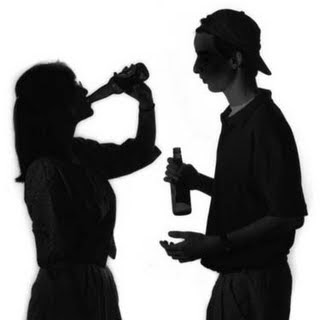
The legal drinking age in Alberta has been 18 since 1972, and there has been the constant question of whether or not the drinking age should be raised from 18 to 19. Some would argue that since 18 year olds are entrusted with the right to vote, go to war, and drive, then it is obvious that they should be entrusted with drinking responsibly. Why should it be that a person turning 18 would be allowed to vote, and thereby influence the government, as well as participate in armed combat, and be allowed to use a firearm, but would not be old enough to drink alcohol? If a person, by the age of 18, is allowed to join the military or vote in the government, that person should also be allowed to drink.
Due to the excessively high legal drinking age in America, teenagers become more prone to binge drinking and out-of-control partying. They are legally blockaded from the alcohol, but they can get it anyway by getting a legal adult to “boot,” or buy the alcohol for them. Therefore, the age should remain at 18, because it is an ideal legal drinking age, where it is not too high that it causes devious behavior, but it is also not too low that the person is not mature enough to handle the responsibility. It is clearly visible that in the U.S with the legal drinking age of 21, the desirable drinking age is 18. In an online petition they argue that colleges and universities would be more successful in trying to regulate the consumption of alcohol rather then trying to prohibit it. When drinking is legal for the students, it will happen out in the open where police officers or health care professionals are present, rather then in basements where students hide their drinking activities. This would lower the amount of alcohol related deaths on campuses.
I believe that if we can educate teens about drinking responsibly much earlier that there would be a higher chance of preventing lethal activities such as drunk driving and alcohol poisoning. Since 1980 when the association M.A.D.D was founded, alcohol-related traffic fatalities have decreased by 44%. This shows that by educating people on the effects of alcohol will reduce the amount of deaths that result from drinking too much.
While there are positive effects of a legal drinking age of 18, there are still positive sides to having a legal drinking age of 19. Alcohol is a depressant, which means that it is a chemical that slows the central nervous system which is detrimental to developing brains. The brains of girls and boys are still considered to be developing at the age of 18, so permitting the consumption of alcohol at this age could end up preventing development of the brain. Mr. Neufeld kindly painted a picture of this effect in class by saying drinking to an extent at an early age would have the same effects as if construction workers were to work on a house while intoxicated. Some would ask how much a single year could impact the choices made with responsible drinking. According to Calgary police chief, Doug Hansen, on Alberta Primetime the year between 18 and 19 is when kids do the most maturing. It is inevitable that teens will experiment with alcohol well before the age of 19 or 18, and adding a year might prevent teens from seeing it as acceptable until later years. While under the influence of alcohol girls are much more susceptible to predators in bars, so a 19 year old woman would probably be more informed of the dangers of being taken advantage of rather then an 18 year old girl out of high school.
There are several pros and cons to different legal drinking ages, but our choices are to either educate teens in hopes to teach responsible drinking, or to prohibit drinking for another year in order for them to gain a little maturity. But the truth is obvious; we find ways of drinking regardless of the age limits, therefore adding or subtracting a year is redundant.
I'd be curious if there is more binge drinking in B.C. vs Alberta with the difference in drinking age. Interesting that you used a police officer as a source on neuro-development.
ReplyDelete